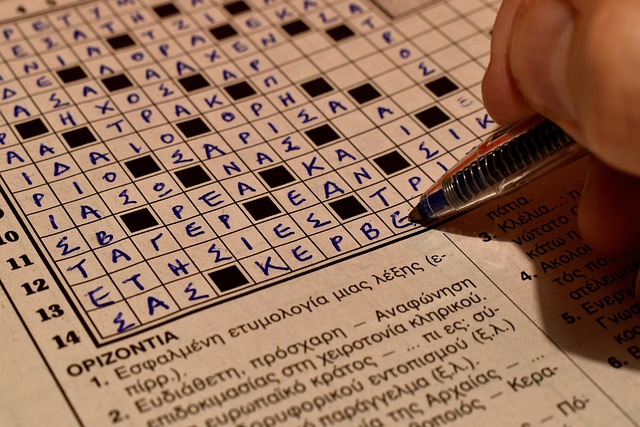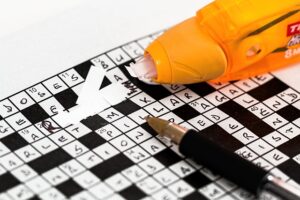Here Is How Crossword Puzzles Help Foreign Language Learners

We all know how extremely difficult it can be to learn a new language. It takes time, dedication, and a lot of practice to become proficient in a foreign language. Duolingo and other language learning apps have made it easier for us to learn a new language, but there are other ways that can be just as smooth and effective. Solving classic crossword puzzles is one of the underrated ways to learn a new language. Not only are they fun and entertaining, but they also offer numerous benefits for foreign language learners. Before you scratch your head in disbelief, read on to learn how these puzzles can help you improve your foreign language skills.
Vocabulary Expansion
Crossword puzzles are fantastic for expanding your vocabulary in a foreign language. As you solve clues, you’ll encounter new words and phrases that may not be part of your everyday language repertoire. This exposure to diverse vocabulary helps you build a more extensive linguistic arsenal. By engaging with various themes, clues ranging from the lump of gum crossword clue to the strips in a club clue, and topics within crossword puzzles, you’ll come across specialized terminology related to different subjects. This targeted learning approach enhances your ability to express yourself on specific topics with precision and clarity.
Furthermore, the repetition involved in solving crosswords reinforces the retention of newly acquired words in your memory. The more frequently you encounter and use these terms while completing puzzles, the more they become ingrained in your lexicon.

Contextual Understanding
Have you ever struggled to grasp the context of a foreign language text? Crossword puzzles can be your secret weapon in improving contextual understanding! These brain-teasers challenge you to think critically about word placement and connections, helping you decipher meaning within a specific linguistic framework. When solving crossword clues, you are forced to consider how words interact with each other within the puzzle grid. This process mimics real-life language usage, where words rely on their surrounding context for proper interpretation. By engaging in this mental exercise regularly, you train your brain to make sense of unfamiliar language patterns more efficiently.
Spelling Practice
Moreover, did you know that, as you tackle clues and fill in answers, you are constantly working on your ability to spell words correctly in a new language? The act of figuring out the correct letters to complete a word reinforces proper spelling patterns and helps commit them to memory. It’s a fun and interactive way to test yourself on how well you have grasped the spelling rules of the language you are learning. Moreover, encountering unfamiliar words in crossword puzzles challenges you to not only spell them correctly but also understand their meanings within the given context. This dual exercise enhances both your vocabulary retention and spelling skills simultaneously.
Pattern Recognition
Crossword puzzles are not just about finding words; they also train your brain to recognize patterns. When solving a crossword, you start noticing recurring themes and structures that help you fill in the blanks more efficiently. As you progress through different puzzles, you begin to see common word patterns and letter combinations. This enhances your ability to anticipate answers based on the clues given. Over time, this pattern recognition skill becomes sharper and more intuitive.
Cultural Insights
 Immersing yourself in a foreign language goes beyond just vocabulary and grammar. It’s about understanding the culture behind the words, phrases, and expressions you learn. Crossword puzzles can provide valuable cultural insights that textbooks might not cover. This firsthand knowledge will enrich your language learning journey by giving you context and relevance to the words you’re studying.…
Immersing yourself in a foreign language goes beyond just vocabulary and grammar. It’s about understanding the culture behind the words, phrases, and expressions you learn. Crossword puzzles can provide valuable cultural insights that textbooks might not cover. This firsthand knowledge will enrich your language learning journey by giving you context and relevance to the words you’re studying.…


 For beginners or those with no prior experience in blacksmithing, an introductory course is an excellent starting point. These courses cover the basics, including safety practices, tool usage, forging techniques, and an overview of different types of blacksmithing. They set the stage for further exploration into the craft and give you a firm understanding of the fundamentals.
For beginners or those with no prior experience in blacksmithing, an introductory course is an excellent starting point. These courses cover the basics, including safety practices, tool usage, forging techniques, and an overview of different types of blacksmithing. They set the stage for further exploration into the craft and give you a firm understanding of the fundamentals.

 The first step in choosing the right grammar check app is considering your writing goals. Are you a student looking to improve your academic writing skills? Or are you a professional writer looking to perfect your craft? Different grammar check apps may be better suited for different writing goals. For example, some apps are specifically designed for academic writing, while others are more geared toward business writing.
The first step in choosing the right grammar check app is considering your writing goals. Are you a student looking to improve your academic writing skills? Or are you a professional writer looking to perfect your craft? Different grammar check apps may be better suited for different writing goals. For example, some apps are specifically designed for academic writing, while others are more geared toward business writing. Finally, it would help to compare the pricing and value of each grammar check app before making a decision. Some apps offer a free basic version, while others require a subscription or purchase to access premium features. While cost is important, it’s also essential to consider the value you are receiving for your investment. Paying a little more for an app that offers comprehensive grammar checking and other valuable features can be worth it in the long run.
Finally, it would help to compare the pricing and value of each grammar check app before making a decision. Some apps offer a free basic version, while others require a subscription or purchase to access premium features. While cost is important, it’s also essential to consider the value you are receiving for your investment. Paying a little more for an app that offers comprehensive grammar checking and other valuable features can be worth it in the long run.
 One of the great things about studying online is that you can learn at your own pace. This means that you can take courses faster or slower depending on your needs and abilities. If you want to advance quickly in your career, online courses are a great option. Or, if you’re looking to learn a new hobby, online courses can help you get started and learn at your own pace. There are many advantages to learning online, and this is just one of them.
One of the great things about studying online is that you can learn at your own pace. This means that you can take courses faster or slower depending on your needs and abilities. If you want to advance quickly in your career, online courses are a great option. Or, if you’re looking to learn a new hobby, online courses can help you get started and learn at your own pace. There are many advantages to learning online, and this is just one of them. You can find an online course on almost any topic, from cooking to accounting. And if you’re struggling to find a particular course offered by your local college or university, chances are there’s an online version you can take instead. This allows you to pursue the topics that interest you the most without being limited by your geographical location.
You can find an online course on almost any topic, from cooking to accounting. And if you’re struggling to find a particular course offered by your local college or university, chances are there’s an online version you can take instead. This allows you to pursue the topics that interest you the most without being limited by your geographical location.

